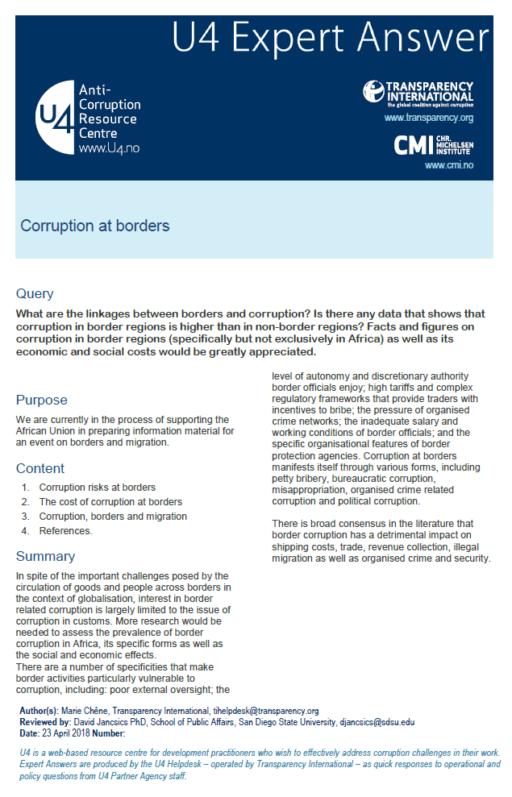
This Anti-Corruption Helpdesk brief was produced in response to a query from a U4 Partner Agency. The U4 Helpdesk is operated by Transparency International in collaboration with the U4 Anti-Corruption Resource Centre based at the Chr. Michelsen Institute.
Query
What are the linkages between borders and corruption? Is there any data that shows that corruption in border regions is higher than in non-border regions? Facts and figures on corruption in border regions (specifically but not exclusively in Africa) as well as its economic and social costs would be greatly appreciated.
Purpose
We are currently in the process of supporting the African Union in preparing information material for an event on borders and migration.
Content
- Corruption risks at borders
- The cost of corruption at borders
- Corruption, borders and migration
- References
Summary
In spite of the important challenges posed by the circulation of goods and people across borders in the context of globalisation, interest in border related corruption is largely limited to the issue of corruption in customs. More research would be needed to assess the prevalence of border corruption in Africa, its specific forms as well as the social and economic effects.
There are a number of specificities that make border activities particularly vulnerable to corruption, including: poor external oversight; the level of autonomy and discretionary authority border officials enjoy; high tariffs and complex regulatory frameworks that provide traders with incentives to bribe; the pressure of organised crime networks; the inadequate salary and working conditions of border officials; and the specific organisational features of border protection agencies.
Corruption at borders manifests itself through various forms, including petty bribery, bureaucratic corruption, misappropriation, organised crime related corruption and political corruption. There is broad consensus in the literature that border corruption has a detrimental impact on shipping costs, trade, revenue collection, illegal migration as well as organised crime and security.
Authors
Marie Chêne, Transparency International, [email protected]
Reviewers
David Jancsics, PhD, School of Public Affairs, San Diego State University, [email protected]
Jessica Schultz, PhD, U4 Anti-Corruption Resource Centre, https://www.u4.no/the-team/jes...
Date
26/07/2018
Tags
 Download PDF
Download PDF
